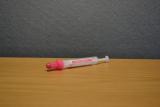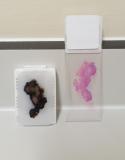Test Directory
Immunoglobulin Gene Clonality
Containers - Adult

Red Cap Tube EDTA KE 2.7ml
|
Volume Range
5ml peripheral blood, bone marrow specimen or FFPE tissue
Additive per Container
EDTA |

FFPE block / H&E slide / Pathology report
|
|
Laboratory Site
Edinburgh
EH4 2XU
Transport arrangements
Specimens should ideally arrive within 24 hours of collection (maximum of 48 hours). There is no time limit for FFPE samples. Samples should be sent to the following address:
Western General Hospital
Haematology/Biochemistry Combined Reception
Immunophenotyping Laboratory
Crewe Road
Edinburgh
EH4 2XU
See also Specimen transportation.
Sample storage arrangements
Samples should be stored at room temperature. See specimen requirements.
How to request
Please refer to our detailed requesting instructions. The HMDS request form can be located here.
Requests for testing FFPE tissue should be sent to the Molecular Pathology Service at RIE with a completed HMDS test request form.
Availability
Monday - Friday 9am-5pm
Anticipated turnaround
Results should be expected within 10 working days. See results.
What happens if the result is positive or abnormal
Requesting clinician will be contacted via telephone or email. Please ensure details are included on request form.
Static information/disclaimer
IG gene rearrangement studies include assessment of IGH, IGK and IGL gene loci. See testing.
IG gene rearrangement assessment is undertaken using the BIOMED‐2 designed assays, with a standard PCR protocol and primer sets designed to target the IGH, IGK and IGL loci. Clonality assessment is a useful tool to aid with the diagnosis of B cell lymphoproliferative disorders. However, the results should always be interpreted in conjunction with morphology, immunophenotyping and/or immunohistochemistry results as well as the clinical findings.
This assay is not suitable for the assessment of low level minimal residual disease in acute leukaemia or lympoproliferative neoplasms.
For details on the interpretation of results, please see Langerak et al., Leukemia 2012; 26:2159-2171
This test is accredited to ISO 15189:2012
For clinical advice on appropriate investigations and advice for the interpretation of test results, please see contact us.